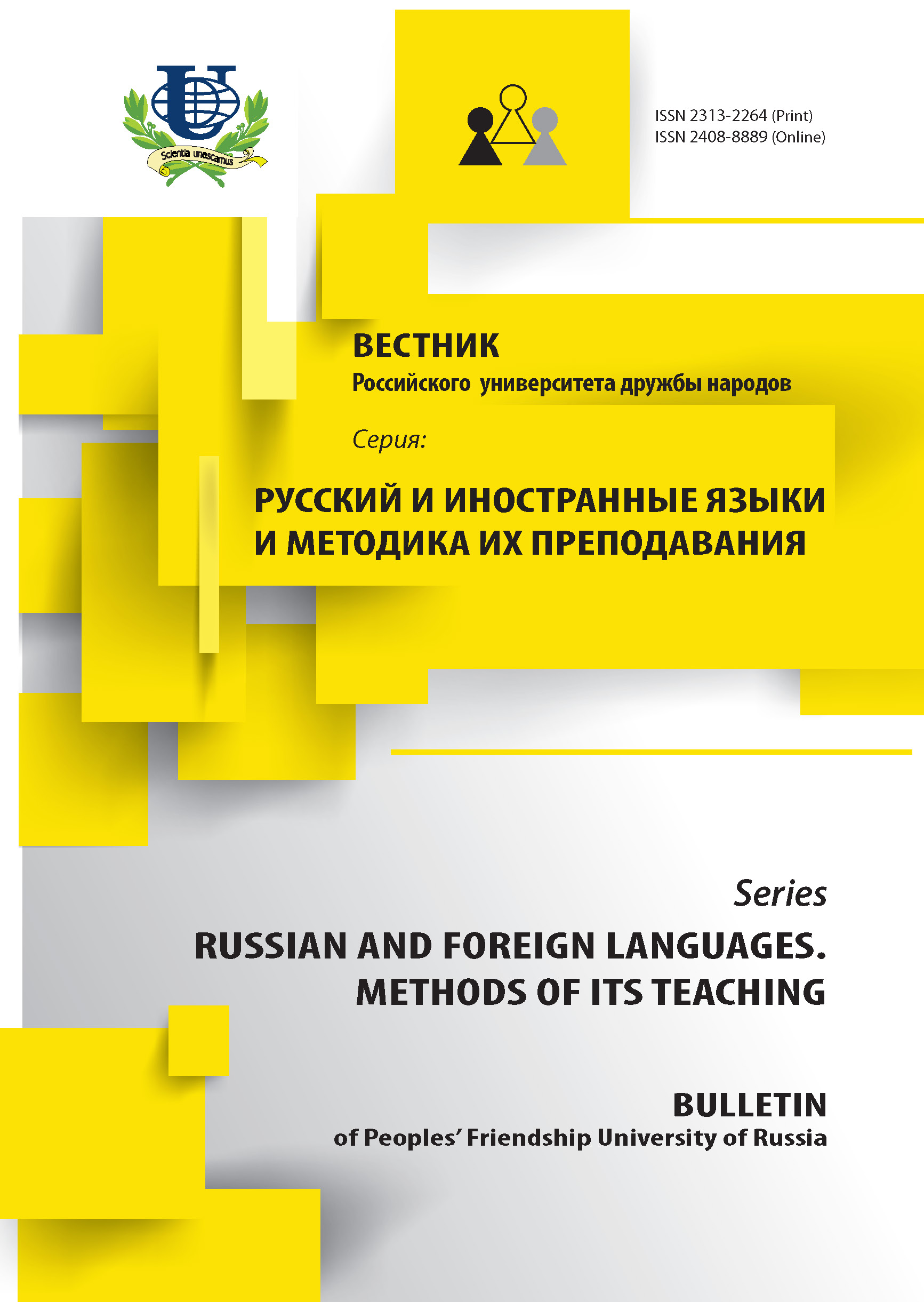No 1 (2012)
- Year: 2012
- Articles: 19
- URL: https://journals.rudn.ru/russian-language-studies/issue/view/603
Articles
 5-11
5-11


Culture of speech: terms and concepts
Abstract
The article characterizes the term culture of speech and other concepts related to it, such as the culture of speech communication, speech culture. A review of the literature on this subject with references to authoritative sources, as well as comparative analysis of the terms and concepts, is presented in the article.
Russian Language Studies. 2012;(1):12-17
 12-17
12-17


 18-23
18-23


Linguistic safety: interpretation aspect
Abstract
The author of the article discusses different approaches to considering linguistic safety as an important factor for the development of modern society. Basing on the approaches, the author offers her own definition of this concept and its basic principles, which allows specifying the direction of future research.
Russian Language Studies. 2012;(1):24-29
 24-29
24-29


 30-35
30-35


On some differences in expressing temporal meaning in russian by case forms with prepositions
Abstract
The author examines Russian temporal case forms with prepositions which are difficult to distinguish for foreigners learning Russian. Differentiation criteria are offered for such forms as na drugoj den and v drugoi den as well as for homonymic forms of за + Instrumental and с + Instrumental.
Russian Language Studies. 2012;(1):36-39
 36-39
36-39


Grammaticalized and lexicalized components in idiomatic constructions of russian language
Abstract
The article deals with structural-semantic features of idiomatic constructions of Russian language, that are connected with using of grammaticalized and vocabularized components in them, which act as elements of block diagram and conjunction combinations in complex idiomatic sentences.
Russian Language Studies. 2012;(1):40-49
 40-49
40-49


 50-55
50-55


Interlingual interference in russian language teaching to chinese students
Abstract
The article is devoted to the problems of interlingual interference in Russian language teaching to students from China. The differences in the structure of a complex sentence in Russian and Chinese languages are observed. The complex of linguo-oriented grammar tasks for Chinese learners is presented.
Russian Language Studies. 2012;(1):56-62
 56-62
56-62


 63-68
63-68


To the question on methodical classification of japanese texts
Abstract
The article analyzes basic differences of Japanese educational texts for foreigners from authentic texts. The division of texts of a journalese genre into descriptive and analytical ones is presented. Methods of working with them are characterized.
Russian Language Studies. 2012;(1):69-76
 69-76
69-76


To the question of principles of teaching foreign linguistic competence in terms of modern teaching methods of foreign languages
Abstract
The article overviews the principles of teaching foreign linguistic competence in accordance with modern teaching methods of foreign languages, comprising the principles of communicative method, basic didactic, general and particular methodical principles, highlighted by the scientists of Russian methodology, who paid attention to this problem.
Russian Language Studies. 2012;(1):77-83
 77-83
77-83


 84-87
84-87


 88-95
88-95


 96-101
96-101


Realization of didactic principles in teaching english lexicology at different educational levels
Abstract
The article shows how continuity principle in teaching English lexicology is realized at different educational levels at Irkutsk State Linguistic University. Special attention is paid to didactic principles on which the author's manuals on Lexicology are based.
Russian Language Studies. 2012;(1):102-111
 102-111
102-111


Patience as a hagiographic concept
Abstract
The article discloses the meaning of the concept Patience in hagiographic genre on the material of the Optina Elders' biographies. Semantic contents of the concept Patience is compared in the modern language and in hagiographic texts. We find out that patience can be seen as a hagiographic concept.
Russian Language Studies. 2012;(1):112-119
 112-119
112-119


Literary and dialect phraseology: history and development
Russian Language Studies. 2012;(1):120-122
 120-122
120-122


Our AutHors
Russian Language Studies. 2012;(1):123-124
 123-124
123-124















